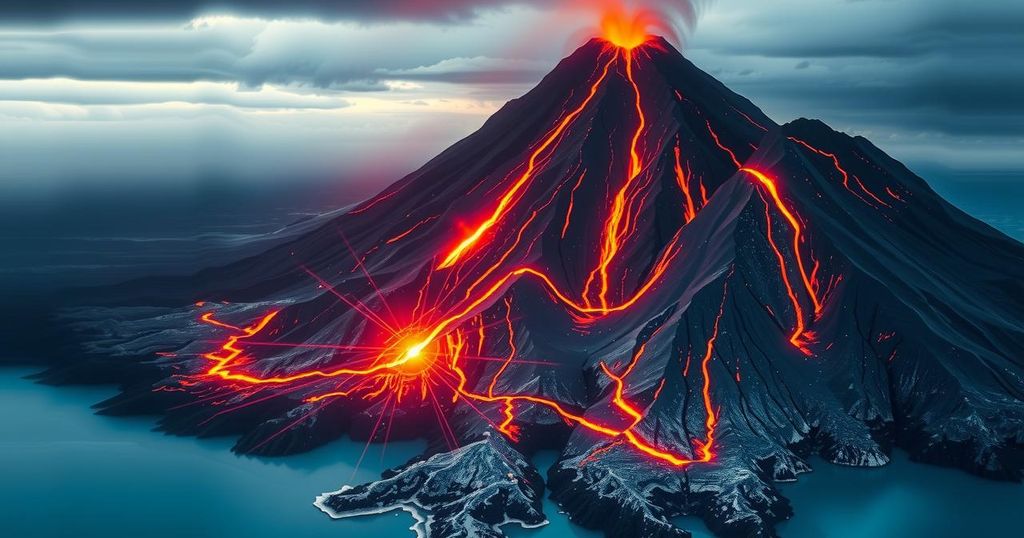Climate experts are warning of an impending massive volcanic eruption that could have catastrophic consequences due to a warming planet. With historical examples like Mount Tambora demonstrating severe impacts on global climate and agriculture, scientists stress the importance of preparation and planning to mitigate chaos. The nexus of climate change and volcanic activity poses unknown risks, necessitating urgent action to safeguard vulnerable populations worldwide.
The impending threat of a significant volcanic eruption looms over the world, raising concerns that humanity is ill-prepared for the chaos it could unleash. Historical instances, such as the eruption of Mount Tambora in 1815, reveal profound disruptions in global climate and agricultural systems, leading to famine and disease. Climate experts, including Markus Stoffel from the University of Geneva, assert that the world faces a substantial risk of another massive eruption occurring within this century, with odds estimated at 1 in 6.
Unlike previous centuries, contemporary conditions render the world more vulnerable due to climate change. The next eruption could exacerbate climate chaos, reflecting an unstable atmosphere. The release of sulfur dioxide, a gas with significant cooling effects, could result in severe temperature drops. Past eruptions, such as Mount Pinatubo in 1991, demonstrated that even moderate eruptions can significantly cool global temperatures and disturb weather patterns.
Future eruptions are likely to have even more significant climate impacts due to several factors. The increased velocity of atmospheric circulation in a warmer world may lead to enhanced dispersal of aerosol particles, resulting in a more effective cooling influence. Furthermore, climate change may alter volcanic activity itself; melting ice can enhance eruptive potential, while extreme rainfall can affect magma chambers, increasing eruption likelihood.
The potential consequences of a major eruption could be catastrophic, particularly given that many people live near active volcanoes. For instance, the Campi Flegrei caldera near Naples, Italy, poses a direct threat to its million residents. In the longer term, dramatic temperature decreases could destabilize major agricultural regions, jeopardizing food security and heightening geopolitical tensions worldwide. Economic losses from such an eruption could exceed $3.6 trillion within the initial year.
While scientific advancements aid in understanding past eruptions, accurately predicting the timing and location of future volcanic activity remains challenging. Experts advocate for proactive measures, emphasizing the necessity for planning and preparedness to handle the fallout from potential eruptions. As the world remains unprepared for such events, increased awareness and action must be prioritized.
Volcanic eruptions have historically played critical roles in shaping global climates and environments. The eruption of Mount Tambora in 1815 is a notable example, leading to widespread agricultural failures and social unrest due to its significant cooling effects. As scientists study past eruptions and their consequences, a modern understanding of these explosive events is crucial, particularly in an age of climate change. The anticipation of a new, impactful eruption in a warming world has prompted experts to call for actionable plans to mitigate the resulting risks. Historical context indicates that eruptions can lead to disastrous impacts far beyond the immediate vicinity of the volcano, affecting global weather patterns, agricultural outputs, and human populations.
In conclusion, the threat of another massive volcanic eruption is imminent and comes with dire implications for a warming planet. Enhanced awareness and readiness are essential for mitigating the potential consequences of such an event, as modern societies are ill-equipped to handle the disruptions that could arise. Historical lessons underscore the urgency for planning and preparedness to protect populations and maintain food security in the wake of catastrophic climatic changes. Experts stress that while eruptions cannot be prevented, proactive measures can significantly lessen their adverse impacts on humanity.
Original Source: www.egyptindependent.com






